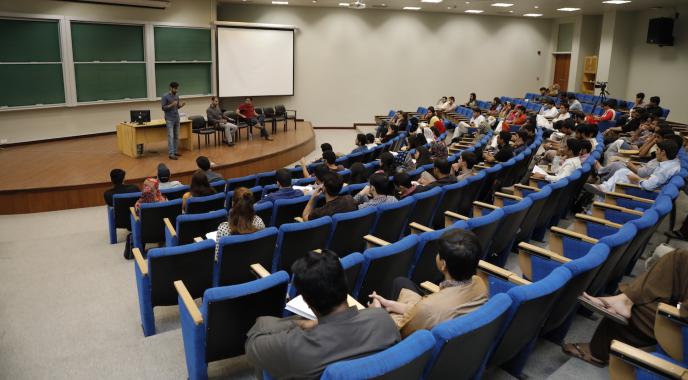
The LUMS Office of Alumni Relations collaborated with the LUMS Career Services Office (CSO) and the CSS Alumni Association on the evening of Friday, October 13, 2017 for the second Central Superior Services (CSS) Mentorship Session.
This session was the second of what is intended to be a series of four CSS mentorship sessions taking place over the next few months.
Organised with the aim of providing guidance and support to a growing community of students and alumni appearing for the Central Superior Services (CSS) examination, the session was led by a panel of alumni currently serving as CSS officers, and included Ejaz Sarwar, BSc 2014; Shahzad Mehboob, BSc 2012; Bilal Ahmed, BS 2014; Eesha Syed, BSc 2015; Hasan Abbas, BSc 2014 and Azhar Khan, BSc 2014.
In continuation from the first session, which covered the fundamentals of the CSS examination such as eligibility criteria and studying timelines, and provided core information on subject selection and book selection, this session was centred entirely on the essay section of the exam.
The alumni panellists outlined what exactly the essay consists of, how much weightage it holds in the context of the entire exam, what the importance of the outline is, and how one should go about structuring and writing the essay.
Addressing the common dilemma among aspirants about whether they should write the outline first or the actual essay first, Mr. Sarwar explained, “Once you have written the outline, you have done half of your work already; you have brainstormed and created a structure, and you just have to expose what you have written in detail, so I recommend writing the outline first.”
He also expressed that a good outline should be extensive and as detailed as possible because the outline is the first thing the examiner marks. “An outline also helps you limit yourself so that you do not stray away from the paradigm you have set yourself, and that ultimately helps with time management,” he said.
One of the aspects to consider while writing the essay, the importance of which every panellist emphasised, is the relevance of the content. Mr. Ahmed shared that the candidates have to deeply analyse the essay question or statement, read it multiple times, and try to address exactly what it demands. The most prevalent reason for the failure of exam-takers is that they do not fully understand what the statement asks, and end up writing completely irrelevant content.
Adding to this, Mr. Abbas stressed the importance of building an argument when writing and maintaining a flow throughout your essay. The attendees were all eyes and ears throughout the session, paying close attention to the words of their seniors, and noting things down when necessary.
Mr. Ahmed summed up the comprehensive advice of the entire panel by explaining to the audience that the three most important things to pass an essay is understanding the format, possessing the knowledge to make solid arguments, and using proper language.
The evening concluded with an interactive question and answer session where the participants got the chance to ask the panellists about their individual essay experiences and learn from them first-hand.






